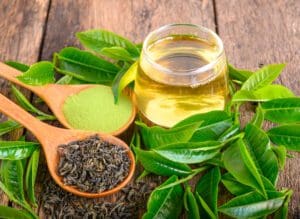Healthy skin begins from within. Often, we reach for topical products to fix skincare concerns, but we also have to consider what we’re eating, as what we put in our bodies affects our complexion. There are a variety of foods that can improve and maintain healthy skin. Let’s discuss!
Avocados
 Avocado is a versatile fruit that can be used to make avocado toast, guacamole, or salads. In a 2021 study by UCLA Health, 39 women ages 27-73 were tasked with eating avocado daily (the control group kept their regular diet). After eight weeks, the skin of the test group was significantly more elastic and firm than the control group’s.
Avocado is a versatile fruit that can be used to make avocado toast, guacamole, or salads. In a 2021 study by UCLA Health, 39 women ages 27-73 were tasked with eating avocado daily (the control group kept their regular diet). After eight weeks, the skin of the test group was significantly more elastic and firm than the control group’s.
Green Tea
 Green tea goes beyond being a comfort drink. A study published in 2012, Protective Mechanisms of Green Tea Polyphenols in Skin, provides evidence that green tea can reduce the harmful effects of free radicals and metal ions on cells. Additionally, dermatologists are interested in using green tea polyphenols to prevent skin cancer because they have shown promising results.
Green tea goes beyond being a comfort drink. A study published in 2012, Protective Mechanisms of Green Tea Polyphenols in Skin, provides evidence that green tea can reduce the harmful effects of free radicals and metal ions on cells. Additionally, dermatologists are interested in using green tea polyphenols to prevent skin cancer because they have shown promising results.
Flaxseed Oil

Flaxseed oil, which contains omega-3 fatty acids, has been shown to improve skin conditions. It is particularly beneficial for wound healing. Research in 2010 found that flaxseed oil supplements can improve skin properties by reducing sensitivity, dryness, and roughness and increasing hydration and smoothness. In addition, flaxseeds contain omega-6 fatty acids, which are essential for healthy skin, as they lubricate the surface cells, making the skin look younger and more radiant.
Fatty Fish
 When there is an omega-3 deficiency, your skin may become rough and scaly. Fish oil is a source of polyunsaturated fatty acids (PUFA), especially omega-3. A 2015 study found that fish oil reduces water loss through the skin and restores skin barrier function, which can help to relieve dryness and itching. Omega-3s are found in many coldwater fish, such as salmon, mackerel, tuna, herring, and sardines.
When there is an omega-3 deficiency, your skin may become rough and scaly. Fish oil is a source of polyunsaturated fatty acids (PUFA), especially omega-3. A 2015 study found that fish oil reduces water loss through the skin and restores skin barrier function, which can help to relieve dryness and itching. Omega-3s are found in many coldwater fish, such as salmon, mackerel, tuna, herring, and sardines.
Tomatoes
 Tomatoes contain lycopene, a carotenoid, a type of natural pigment that gives many fruits and vegetables their red, orange, and yellow colors. It is also a derivative of vitamin A, a highly effective antioxidant with photoprotective properties. A 2005 clinical study found that people who consumed tomato extract or tomato-based products for 12 weeks experienced less sunburn after exposure to UV light than those who took synthetic lycopene.
Tomatoes contain lycopene, a carotenoid, a type of natural pigment that gives many fruits and vegetables their red, orange, and yellow colors. It is also a derivative of vitamin A, a highly effective antioxidant with photoprotective properties. A 2005 clinical study found that people who consumed tomato extract or tomato-based products for 12 weeks experienced less sunburn after exposure to UV light than those who took synthetic lycopene.






